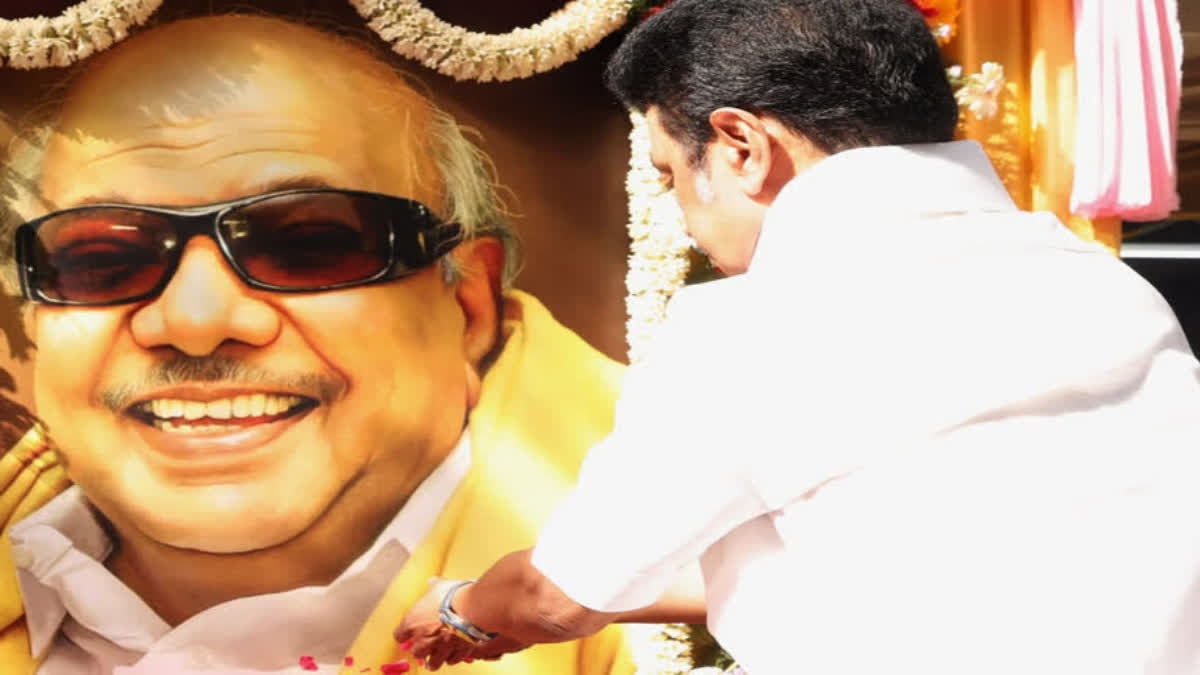Chennai: Carrying the legacy of social justice and continuing the project of democratising Tamil society, the DMK is entering into 75th year. Parting ways with the Dravidar Kazhagam (DK) of rationalist leader ‘Periyar’ EV Ramasamy, the DMK was founded on September 17, 1949. While the DK was committed not to enter electoral politics, the DMK led by CN Annadurai, popularly called ‘Anna’ (the elder), swept to power in 1967, the first regional party to taste power. It signalled the decline of not only the Congress, but sustained denial of political space enough for any national party to counter Dravidian hegemony to be an alternative in the foreseeable future.
As the heir of the Justice Party, launched in 1916, and the Dravidian movement, the DMK had several achievements to its credit, though there is criticism that it could have done more. Welfare coupled with development and empowerment can be described as the Dravidian Model, shaped both by the DMK and the AIADMK, formed in 1972 by the charismatic film icon MG Ramachandran (MGR), which alternately ruled the state since 1967. But, the template and framework for this was laid by the late patriarch from 1969 onward, when he became the Chief Minister.
It is quite interesting that Karunanidhi was not among the prominent five leaders, who launched the party at Robinson Park in North Chennai. Even when Anna passed away in 1968, he was fourth in the rank of seniority and prominence. After 1967, the DMK has been in power for more than two decades while the rest was shared by the AIADMK.
In public health and education as well as bus connectivity to the nook and corner, Tamil Nadu stands far ahead of other states and the credit should go to the DMK. The free 20 kg rice for ration card holders through the public distribution system (PDS) is a significant one and so is the morning breakfast in primary schools implemented now. “Freebies will continue so long as the poor exist,” was Karunandhi’s response to criticism, frowning upon those who called welfare freebies. “Welfare has been taken to newer heights, making it difficult for the BJP or any other party to offer anything more. Empowerment through modern education has been a thrust area together with development,” says R Thirunavukkarasu, teaching sociology at the University of Hyderabad.
Also read: Sanatan Row: Centuries-old contrarian discourse in Tamil Nadu
But, criticism abounds as questions remain about the party’s future trajectory. “The Dravidian movement had outlived its utility,” was the most stinging one from late Japanese Tamilologist and historian Noboru Karashima. “Personality cult getting entrenched in the party, firmly in the grip of the first family and Dalits remaining on the fringes in the leadership hierarchy, which is in the hands of the dominant backward castes, cannot be wished away. That the party remains ideologically watered down if not totally bankrupt is very much evident from welfare without a political idiom,” argues C Lakshmanan, former faculty at Madras Institute of Development Studies (MIDS).
“Emergence of Dalit political parties Hindutva assertion becoming more vocal of late is proof of the DMK and the Dravidian movement lacking inclusivity and accommodation. It also exposes that the Dravidian movement is anti-intellectual, turning public discourse sterile and barren. Welfarism has its limitations. Rhetoric and highly monetised elections can’t be a substitute for politics,” says Professor Velayutham Saravanan of Jamia Millia Islamia University, New Delhi. “To be relevant, it necessarily has to walk the talk and provide a new narrative, which is effective enough to counter and contain the saffron brigade, which is on the offensive,” he added.
The persistent attempts to paint the DMK as anti-Hindu remains a pebble in its shoe. “This is because the party has not yet understood the spiritual space and conflates it with orthodoxy and religion. Its rationalism has failed to take into account the need for celebration and creating an alternative cultural paradigm,” reasons senior journalist Dayalan Shanmugha. It was the late Vinod Mishra, general secretary of the CPI (ML), who had predicted earlier the DMK’s alliance with the BJP in 1998. “If the DMK could sacrifice rationalism at the altar of power, it might not be far off for it to guillotine secularism,” he had said. But now, political compulsion and survival had forced the party to be at the forefront of the battle against the BJP.



